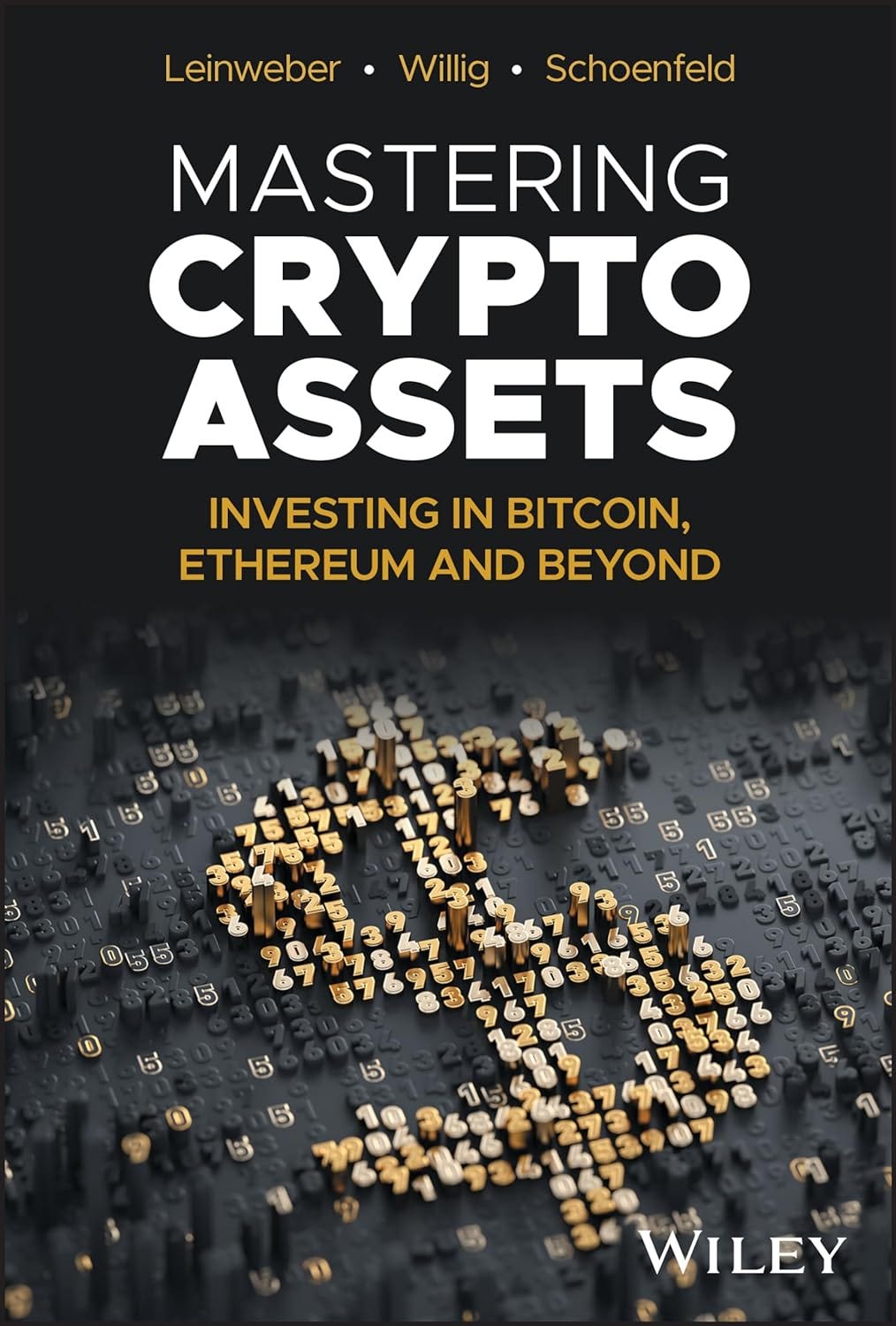The Next Chapter in Digital Assets: Insights from Peer Summit
Dear Investors,
Welcome to this week’s edition of the Myth of Money. If you would like to keep in closer touch, please reach out on X (formerly Twitter) below.
This past week, I attended Peer Summit, an invite-only digital assets industry event at Powder Mountain, Eden, Utah. Organized by the investor duo Jack Herrick and Jared Hutchings of Peer VC, the event brought together the who's who of the cryptocurrency world. The guest list boasted industry titans from Multicoin Capital, Framework, and Pantera Capital. The sentiment was undeniably bullish.
Among the whirlwind of discussions and groundbreaking ideas, three main narratives stood out:
1. The Rise of DePINs (Decentralized Physical Infrastructure Networks): A groundbreaking concept that merges blockchain technology with the development of physical infrastructure. DePINs represent a new frontier in applying digital solutions to tangible world challenges in areas like transportation, energy, and wireless connectivity. These networks not only utilize blockchain for managing real-world facilities but also implement token rewards as an incentive for contributing to these infrastructures. Projects such as IoTEX, Helium, and Bittensor are some examples of projects leading the charge.
2. Gaming in the Cryptocurrency Era: The sentiment here was more mixed. A major topic of discussion revolved around the practicality and feasibility of integrating cryptocurrencies into gaming, especially considering the complex tax and regulatory frameworks in Western countries. The jury is still out on whether crypto can truly revolutionize the gaming industry.
3. Social Networks and NFTs: An exciting development is the transition of NFTs from just collectibles to potent tools for brand engagement. Alongside this, there's a growing interest in tokenized social networks, suggesting a shift towards more decentralized, user-driven platforms.
Another innovative project that caught everyone's attention was zkMe. This platform is leveraging zero-knowledge proofs to create Identity Oracles, ensuring secure and private credential verifications. It's a step forward in integrating biometric identities, like WorldCoin, with blockchain technology.
The intersection of AI and Crypto was another hot topic, suggesting a symbiotic relationship that could redefine both fields.
Lastly, we looked at ecosystems that are poised for success. Solana, Arbitrum, Starkware, SUI, and Stacks were highlighted as platforms with immense potential, indicating exciting times ahead in the crypto space.
Looking ahead to 2024, the consensus at the summit was that the space might enter a 'boring' phase. This doesn't imply a lack of progress; rather, it indicates a maturation of blockchain technology. The excitement around blockchain as a novel technology is expected to give way to its integration as a fundamental part of the technological stack. Blockchain is anticipated to become a means to an end, seamlessly integrating into various applications and industries rather than being the focal point.
One unexpected topic mentioned was the Chevron Doctrine which is currently in front of the courts.
The potential repeal of the Chevron Doctrine could have profound implications for the digital assets sector, particularly in the way tokens are classified as securities. Established by the U.S. Supreme Court in 1984, this doctrine plays a pivotal role in administrative law, guiding how federal courts review administrative agencies' interpretations of statutes. The doctrine operates in two steps: firstly, determining the clarity of a statute, and secondly, deciding whether an agency's interpretation of an ambiguous statute is reasonable. In cases where the interpretation is deemed reasonable, the courts typically defer to the agency's expertise.
The impact of this doctrine on digital assets lies in its influence on how regulatory agencies, like the Securities and Exchange Commission (SEC), interpret and enforce laws regarding securities. The classification of tokens as securities or not can hinge on how agencies interpret relevant statutes, such as the Securities Act of 1933. If the Chevron Doctrine were to be repealed or reformed, it could lead to a shift in the balance of power from federal agencies to the judiciary. This change might result in more stringent or different interpretations of what constitutes a security in the realm of digital assets, affecting how these assets are regulated, traded, and perceived in legal contexts.
Finally, we saw bullish sentiments for stables, particularly among investors sitting in Hong Kong and the Eastern Hemisphere.
It was also our first team trip for our new investment management firm Moonwalker Capital. Saif and I loved reconnecting with everyone as we are about to launch next month!
What I’m Reading This Week 📚
Last year I signed a book deal with Wiley, one of the most seasoned cryptocurrency and finance publishes in the game.
This week, they published an all-encompassing book on digital assets of all types for investors.
In Mastering Crypto Assets: Investing in Bitcoin, Ethereum and Beyond, a team of seasoned investors and digital asset strategists presents a comprehensive guide aimed at institutional and professional investors for integrating crypto assets into traditional portfolios. The book offers in-depth explanations of the structure of this new asset class and its impact on investment portfolios.
Available on AMAZON here → link.
This Week By the Numbers 📈
Quick Facts:
The Federal Reserve anticipates interest rate cuts in Q3
Gold is on track for its most significant two-month decline
President Biden plans to cancel $4.9 billion in student loans
A tech-led rally boosts the stock market, with futures also rising
Nvidia and AMD reach all-time highs due to surging chip demand
X debuts its Payments account
DOGE experiences a surge amid rumors about integration with X payments
Bitcoin trends show whale accumulation and a decrease in retail interest
Newly launched Bitcoin ETFs achieve up to $4 billion in assets under management
Options for Bitcoin ETFs expected to be available in February
Grayscale Bitcoin Trust experiences outflows of $1 billion, surpassing inflows of other ETFs
Record profit-taking observed among long-term Bitcoin holders
The SEC's lawsuit against Coinbase faces a 70% chance of being dismissed
New Hampshire's primary on Tuesday, with Trump predicted to win
Increased activity in Punks NFTs, with $2 million spent on rare items
Solana's stablecoin transfers set a new all-time high, exceeding those on Ethereum
Solana Mobile secures 30,000 pre-orders within two days
Tether issues $10 billion in three months, approaching the exclusive $100 billion cryptocurrency club
Top Stories 🗞️
Reddit seeks to launch IPO in March
Social media platform Reddit has drawn up detailed plans to launch its initial public offering (IPO) in March, moving forward with a listing it has been eyeing for more than three years, according to people familiar with the matter. It would be the first IPO of a major social media company since Pinterest's debut in 2019, and would come as Reddit and its peers face stiff competition for advertising dollars from the likes of TikTok and Facebook. The offering would also test the willingness of some Reddit users to back the company's stock market debut. Many investors posting on the platform have helped fuel dozens of "meme" stock rallies in the last three years, from retailer GameStop to movie operator AMC Entertainment Holdings. Reddit, which filed confidentially for its IPO in December 2021, is planning to make its public filing in late February, launch its roadshow in early March, and complete the IPO by the end of March.
Judge in SEC v. Binance case will hear arguments on whether crypto is a security
Federal Judge Amy Berman Jackson — overseeing the United States Securities and Exchange Commission case against Binance, Binance.US and former CEO Changpeng Zhao — has ordered a court review of whether digital assets are securities. Judge Jackson said she would hear arguments on how the SEC treated cryptocurrencies under current regulatory and legal frameworks. Lawyers representing Binance.US will be allowed to address “whether a digital asset remains a security in perpetuity” and the SEC’s allegations that staking may be considered a security. The Howey test has been the SEC’s standard for determining what is a security, is by ruling whether an asset meets the definition of an investment contract. In many of its legal actions against U.S. crypto firms, the SEC has claimed that tokens largely qualify as securities and are subject to regulatory oversight by the commission instead of the Commodity Futures Trading Commission. In July 2023, a judge overseeing the SEC’s case against Ripple ruled the XRP token was not a security regarding programmatic sales on digital asset exchanges.
Houthis Declare Safe Passage For All Russian, Chinese Ships In Red Sea
In a remarkable development, and at a moment European retailers and factories are beginning to bear the brunt of the global shipping chaos and soaring Red Sea transit risk, the Houthis have declared safe passage for Russia and China. A senior Houthi official, Mohammed al-Bukhaiti, said "As for all other countries, including Russia and China, their shipping in the region is not threatened," he said, stipulating this will remain as long as they are not linked to Israel or its supporters."Our goal is to raise the economic costs for [Israel] in order to stop the carnage in Gaza." Some of the vessels which have come under attack thus far actually have connection to dozens of countries, but ships with Russian or Chinese ownership, or deep ties, have yet to be attacked. The US-UK coalition patrolling the Red Sea has at this point launched four rounds of airstrikes against Houthi positions, but this appears to have only deepened Houthi resolve.
FTX users ask court to reject repayment plan based on Nov. 2022 values
Former FTX customers are asking a judge to reject the bankrupt exchange’s proposed reimbursement values for cryptocurrencies, arguing that the plan would cost them significant profits. Under the proposed plan, the FTX estate would settle up with customers by repaying them in US dollars based on the value of their crypto assets in November 2022. But cryptocurrencies have rebounded since FTX’s collapse — bitcoin (BTC) has gained more than 160% alone — and exchange clients argue a payout based on proposed strike prices is unfair. Under FTX’s terms of service, one customer pointed out, the client is the owner of the digital asset, not FTX, so fiat reimbursement is unacceptable. Under the current plan, customers will be reimbursed around $16 per Solana (SOL) token, and $1,260 per ether (ETH). As of Friday, SOL was currently trading at about $94 and ETH was sitting near $2,450.
Sam Altman seeks to raise billions for network of AI chip factories
OpenAI CEO Sam Altman plans to use the billions of dollars he is trying to raise for a chip venture for setting up a network of factories that will manufacture semiconductors. Altman has had talks with several large potential investors in the hopes of raising the vast sums needed for chip fabrication plants, colloquially known as fabs. The project would involve working with top chip manufacturers and the network of fabs would be global in scope. Manufacturing chips is expensive. They also require copious amounts of natural resources, in addition to the billions of dollars in funding. Costs have been rising over the years as technology advances to make chips used in artificial intelligence applications. Abu Dhabi-based G42 and SoftBank Group are among the firms that have held discussions with the OpenAI boss, but the talks are still early and a full list of involved partners and funders has not been established.
My Top 10 Investment Ideas for 2024 🐸
This week, we are offering an additional free knowledge source - My Top 10 Investment Ideas for 2024, including picks across stocks and crypto, and my reasoning behind making those investments personally.
To receive this product, simply refer 3 friends using your unique shareable link 👇
Thank you for reading this week’s edition of the Myth of Money.🚀
Were you forwarded this email? Subscribe below.
Until next week,
Tatiana Koffman
About the Author: Tatiana Koffman
Hi there and thanks for reading! If you stumble upon my newsletter, you will notice that I write about money, economics, and technology. I hold a JD/MBA and spent my career in Capital Markets working across Mergers & Acquisitions, Derivatives, Venture Capital, and Cryptocurrencies. I write to make financial topics more accessible and create equal opportunity for the next generation of investors. I have personally invested in 20+ companies and funds (👉 my portfolio).






